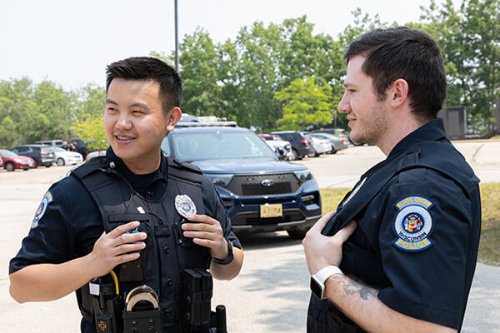Justice & Community Advocacy - Associate Degree
The demand for individuals in service-oriented jobs is growing. The Justice & Community Advocacy program will teach students the functions of community advocacy agencies, correctional facilities, operations in probation & parole, criminal justice agencies, private investigation and emergency dispatch careers. Completion of this degree provides the graduate knowledge to improve lives of individuals and communities in a variety of jobs and interests. Graduates will learn how to provide services and assistance in socially conscious and inclusive way that inspire the neediest individuals and families to envision a future with hope. Graduates will also learn skills in situational awareness & defense, crisis management and de-escalation, substance abuse, mental health services and special needs populations.
Impact Careers Start Here
If making a positive social impact is your career goal, you have countless paths – in shelter care, private investigation, 911 dispatch, probation and parole, corrections, juvenile detention, and many more in-demand fields that make a difference.
Get your start with the Justice and Community Advocacy degree. You'll gain hands-on skills in investigation practices, crisis management, motivational interviewing, situational awareness/defense, and more – with a solid foundation in communication, advocacy, and inclusion.
Program Costs & Financial Aid
See costs of tuition, books, and supplies.This program is fully eligible for financial aid.
Estimates based on in-state residency. Learn more about tuition and fees.
Explore Locations
Follow Your Path
The following Human Services Associate Degree courses below apply towards this program: Intro to Interview & Counsel, Understanding Substance Use, Advocacy of Special Population, Motivational Interview
Delivery
Please Note: If enrolling in this program in Marinette, you'll start your degree in Marinette and finish your degree on the Green Bay campus.
How do I get started in this program?
Requirements for Program Entry
- Apply at www.nwtc.edu/apply
- Submit the following: High school transcript (or GED/HSED transcript) or College transcript. If your cumulative GPA is below 2.6, complete or submit a placement evaluation.
- Tip! Our admission advisors will assist you through every step. Have questions? Connect with NWTC Admissions at start@nwtc.edu or 920-498-5444.
What are my courses?
Curriculum
Students following the study plan below will complete the Justice & Community Advocacy associate degree in the number of semesters shown.
First Semester
8 Week 1
8 Week 2
Second Semester
8 Week 1
8 Week 2
Third Semester
8 Week 1
8 Week 2
Fourth Semester
8 Week 1
8 Week 2
- Curriculum Note: The credit for 10-890-101, College 101 is an Institutional Requirement for graduation. Consequently, it is not part of the program credit requirements, but must be passed with a "C" or better.
What careers are in my future?
The following certificates/technical diplomas may be applied toward this program:
- Private Investigator Pathway Certificate
- Emergency Dispatch Pathway Certificate
Employment Potential
Community Support Workers/Community Advocates
- Shelter Care Worker
- 9-1-1 Telecommunicator / Dispatch
- Probation & Parole Agent
- Correctional Officer
- Prison Guard
- Juvenile Detention Officer
- Home Detention Specialist
- Probation & Parole Agent
- Law Enforcement Officer
- Conservation Officer
- Private Investigator
- Security / Loss Prevention
Employment opportunities with additional education
- Upon successful completion of this program, along with additional coursework, graduates can earn certifiability status with the Wisconsin Department of Justice (WIDOJ) Law Enforcement Academy and/or Jail Academy.
What's next after graduation?
Start here. Finish at a four-year.
NWTC transfer programs are offered through collaborative agreements with our four-year college and university partners. See where your associate degree credits will transfer.
What else do I need to know about the program?
Note
- Students with a criminal history including, but not limited to a felony, misdemeanor and domestic violence arrests may be denied employment in the public safety field. Extensive background checks by an employer often include any or all of the following—criminal history check, employment history, credit history check, psychological testing, physical agility testing, drug testing and/or driving record check at the discretion of the employing agency. Consequently, should a student have a history of convictions of crimes or a history of improper behaviors, NWTC cannot guarantee employment in the field or guarantee of graduation within typical program timing.
- Online
-
Classes wherever you have an internet connection.
- An in-person career experience, such as an internship, practicum, or credit for prior learning, may be required.
- Some online courses may be held at specific dates/times.
- Day
- Classes between the hours of 6:00 a.m. and 5:30 p.m.
- Evening
- Classes between the hours of 5:30 p.m. and 10:30 p.m.
- Weekend
- A combination of online classes and Saturday and/or Sunday classes.
- Full-time
- 12 or more credits per term.
- Part-time
- Fewer than 12 credits per term.


